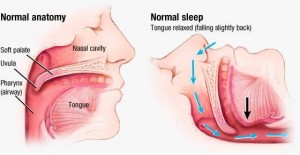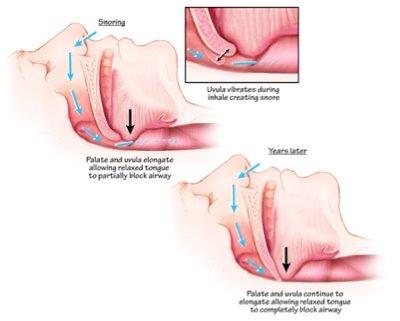 Up to one-half of normal adults snore at least occasionally, with worsening occurring with age and weight gain. Snoring occurs when there is an obstruction to airflow through the passages at the back of the mouth and nose. Because these areas are collapsible, they may vibrate during sleep due to relaxation of the tissues when air passes by during breathing. In children, snoring is often a sign of enlargement of the tonsils and adenoids.
Up to one-half of normal adults snore at least occasionally, with worsening occurring with age and weight gain. Snoring occurs when there is an obstruction to airflow through the passages at the back of the mouth and nose. Because these areas are collapsible, they may vibrate during sleep due to relaxation of the tissues when air passes by during breathing. In children, snoring is often a sign of enlargement of the tonsils and adenoids.
Contributing Factors
Anatomically, there are a few areas that contribute to the obstruction in the upper airway. When sleeping, muscle tone in the tongue and throat naturally decreases. When these muscles relax, the tongue falls backward into the airway, and the throat muscles may collapse in from the sides.

This phenomenon can be exacerbated by alcohol and drugs. Excessive bulkiness of the throat tissue from enlarged tonsils and adenoids, cysts or tumors in the airway, or excess soft tissue of the neck in overweight people can also lead to airway narrowing. Elongation of the soft palate and/or uvula may additionally contribute to soft tissue blockage. Finally, obstructed nasal airways (from a deviated septum , nasal polyps, or enlarged turbinates) require extra effort to pull air through it. This creates an exaggerated vacuum in the throat that pulls together the floppy tissues of the throat, and snoring or apnea results. This explains why snoring may worsen when allergy or sinus problems occur.
Schedule an Appointment
If you would like to schedule an appointment with the Tennessee Sinus and Snoring Center please click on the link below.
